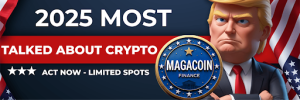
- President-elect Donald Trump threatens to impose 100% tariffs on BRICS nations if they attempt to replace the US dollar with a new currency.
- The potential introduction of these tariffs could disrupt global supply chains, increase inflation in the US, and strain diplomatic relations.
In a recent bold statement via his Truth Social network, Donald Trump, the newly elected President of the United States, has shocked global markets by threatening to impose hefty tariffs on BRICS nations—Brazil, Russia, India, China, and South Africa.
This move comes at a time when the dollar’s uncontested role as the backbone of international trade is increasingly being questioned by these emerging economies.
Trump’s declaration aligns with his well-established “America First” economic strategy, aiming to maintain the U.S. dominance in global commerce.
“We demand that these countries commit not to create a new BRICS currency or support another currency to replace the mighty US dollar,”
Trump stated. He emphasized that any deviation from this demand would lead to immediate economic sanctions, including severe tariffs and exclusion from the American market.
The immediate ramifications of Trump‘s statement are clear: introducing such trade tariffs could significantly elevate import costs within the United States, leading to higher inflation and strains on global supply chains.

Observers note, however, that these effects could also backfire, complicating the U.S.’s diplomatic and commercial relationships with several strategic partners.

The Challenges Facing the BRICS Project
For years, the BRICS nations have sought to reduce their reliance on the dollar, viewed as a tool of U.S. political and economic hegemony. At a recent summit in Kazan, Vladimir Putin reiterated this aim, although he tempered expectations about a shared currency, declaring the initiative
“not yet mature.”
This project remains more a strategic consideration than an operational reality, highlighting the BRICS countries’ internal challenges, such as economic heterogeneity and political disputes, which complicate the coordination necessary for such a significant undertaking.
Nevertheless, this endeavor illustrates a growing desire to promote a multipolar world where the economic rules are not solely dictated by the major Western powers. Should the U.S. choose to economically isolate these nations, it could inadvertently accelerate this shift, with unpredictable effects on the global economy.
The threat issued by Donald Trump marks a significant turning point in the relationships between the United States and the BRICS nations. While the ambitions of the latter are still in their nascent stages, any escalation in commercial tensions could pose a risk of destabilizing the global economy and altering the balance of economic power.
The ongoing standoff raises critical questions about whether this impasse will ultimately benefit the United States or hasten the transition to a new global economic order.
The post Dollar Dominance at Risk: Trump’s Economic Ultimatum to BRICS Nations appeared first on ETHNews.

